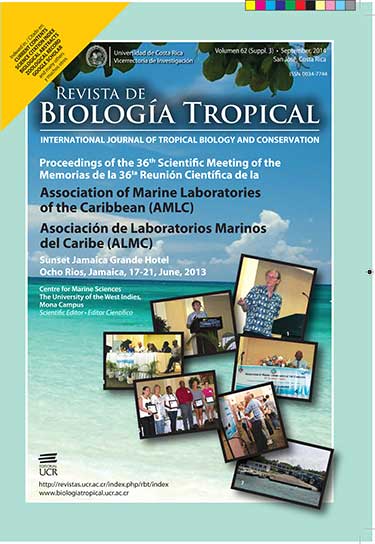Abstract
Current challenges to coral reef sustainability include overfishing, destructive fishing practices, bleaching, acidification, sea-level rise, starfish, algae, agricultural run-off, coastal and resort development, pollution, diseases, invasive species and hurricanes. We used SCUBA belt transects to record coral cover and digital image analysis in the Dairy Bull Reef off the north coast of Jamaica and found that it is a positive example of how reefs can recover after major environmental disturbance. Live coral cover increased from 13±5% in 2006 to 31±7% in 2008, while live Acropora cervicornis increased from 2±2% in 2006 to 22±7% in 2008. Coral cover levels were maintained until 2012. Rev. Biol. Trop. 62 (Suppl. 3): 137-140. Epub 2014 September 01.References
Bruckner, A.W. (2012). Static measurements of the resilience of Caribbean coral populations. International Journal of Tropical Biology and Conservation, 60(suppl. 1), 39-57.
Crabbe, M. J. C. (2009). Scleractinian coral population size structures and growth rates indicate coral resilience on the fringing reefs of North Jamaica. Marine Environmental Research, 67, 189-198.
Crabbe, M. J. C. (2010). Topography and spatial arrangement of reef-building corals on the fringing reefs of North Jamaica may influence their response to disturbance from bleaching. Marine Environmental Research, 69, 158-162.
Crabbe, M. J. C., & Carlin, J. P. (2007). Industrial sedimentation lowers coral growth rates in a turbid lagoon environment, Discovery Bay, Jamaica. International Journal of Integrative Biology, 1, 37-40
Díaz-Pulido, G., McCook, L. J., Dove, S., Berkelmans, R., Roff, G., Kline, D. I., ... & Hoegh-Guldberg, O. (2009). Doom and boom on a resilient reef: climate change, algal overgrowth and coral recovery. PLoS One, 4(4), e5239.
Eakin C. M., Morgan, J. A., Heron, S. F., Smith, T. B., Liu, G., Alvarez-Filip, L., Baca, B., Bartels, E., Bastidas, C., … & Yusuf Y. (2010). CaribbeanCorals in Crisis: Record Thermal Stress, Bleaching, and Mortality in 2005. PLOSONE, 5(11), e13969. doi:10.1371/journal.pone.0013969
English, S., Wilkinson, C., & Baker, V. (1997). Survey Manual for Tropical Marine Resources, 2nd Edition. Townsville: Australian Institute of Marine Science.
Huston, M. (1985). Variation of coral growth rates with depth at Discovery Bay, Jamaica. Coral Reefs, 4, 19-25.
Idjadi, J. A., Lee, S. C., Bruno, J. F., Precht, W. F., Allen-Requa, L., & Edmunds, P. J. (2006). Rapid phase-shift reversal on a Jamaican coral reef. Coral Reefs, 25, 209-211.
Jones, L., Alcolado, P. M., Cala, Y., Cobián, D., Coelho, V., Hernández, A., Jones, R., Mallela, J., & Manfrino, C. (2008). The effects of coral bleaching in the northern Caribbean and western Atlantic, pp. 73-83. In Wilkinson, C., & Souter, D. (eds.). Status of Caribbean Coral Reefs after Bleaching and Hurricanes in 2005. Townsville, Australia: Global Coral Reef Monitoring Network, and Reef and Rainforest Research Centre.
Kinzig, A. P., & Pacala, S. W. (2001). Successional biodiversity and ecosystemfunctioning, pp. 175-212. In Kinzig, A.P., Pacala, S.W., & Tilman, D. (Eds.), The functional consequences of biodiversity. Princeton, USA: Princeton University Press.
Mallela, J., & Crabbe, M. J. C. (2009). Hurricanes and coral bleaching linked to changes in coral recruitment in Tobago. Marine Environmental Research, 68, 158-162.
Mumby, P. J., Hastings, A., & Edwards, H. J. (2007). Thresholds and the resilience of Caribbean coral reefs. Nature, 450, 98-101.
Quinn, N. J., & Kojis, B. L. (2008). The recent collapse of a rapid phase-shift reversal on a Jamaican north coast reef after the 2005 bleaching event. International Journal of Tropical Biology and Conservation, 56 (suppl. 1), 149-159.
Sary, Z., Oxenford, H. A., & Woodley, J. D. (1997). Effects of an increase in trap mesh size on an over-exploited coral reef fishery at Discovery Bay, Jamaica. MarineEcology Progress Series, 154,107-120.
Stat, M., Loh, W. K. W., Hoegh-Guldberg, O., & Carter, D. A. (2008). Symbiont acquisition strategy drives host-symbiont associations in the southern Great Barrier Reef. Coral Reefs, 27, 763-772.
##plugins.facebook.comentarios##

This work is licensed under a Creative Commons Attribution 4.0 International License.
Copyright (c) 2014 Revista de Biología Tropical






